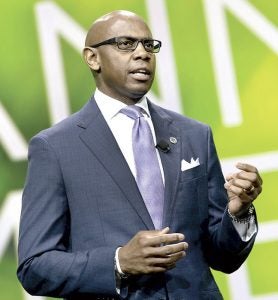Wynn addresses electric co-op leaders at national conference
Published 6:16 pm Friday, March 13, 2020
|
Getting your Trinity Audio player ready...
|
NEW ORLEANS, LA – Electric cooperatives must go beyond being members’ trusted energy advisers to become “trusted energy investors” that offer innovative solutions accessible to everyone, Roanoke Electric Cooperative President and CEO Curtis Wynn told co-op leaders in early March at the annual conference of the National Rural Electric Cooperative Association in New Orleans.
“In this new role as trusted energy investor, I want to make the case that, through well-planned and smart investments, we can make the next generation of electric cooperatives a reality for all of our members,” said Wynn, who is entering his second and final year as president of the NRECA board of directors. “It matters to the future of our co-ops.”

Roanoke Electric Cooperative President and CEO Curtis Wynn is in his second and final year as president of the National Rural Electric Cooperative Association board of directors. Contributed Photo
Speaking before more than 6,000 conference attendees, Wynn offered several examples of innovative investments that co-ops are making nationwide, including Roanoke Electric’s Upgrade to $ave program. The program offers energy audits to member-owners to help make their homes more energy efficient and lower their monthly electric bills.
The Upgrade to $ave program makes improvements to members’ homes, and the members pay the co-op back each month out of the average energy savings created by the efficiency upgrades.
So far, through Upgrade to $ave, Roanoke Electric has invested more than $2.9 million into energy-efficient upgrades that include heat pump improvements, insulation, water heater wraps, LED lighting, and duct and air sealing. More than 500 member-owners already have benefited from this high-impact program.
Innovative programs like these are essential for electric cooperatives to achieve the “purpose and promise of being engines of opportunity in the communities we serve,” Wynn said. He noted that 92 percent of Americans who are identified as living in high-poverty areas nationally are served by electric cooperatives. Of the seven counties served by Roanoke Electric, six are classified by the federal government as having high-poverty levels.
Wynn also cited the Sustainable Forestry and Land Retention Project that REC sponsors as an innovative effort to help increase family assets and raise the standard of living of member-owners the co-op serves. More than 205 of the region’s landowners participate in the program, and sustainable forestry practices are being implemented on about 10,000 acres of land.
“America’s electric co-ops can be a force for the future,” Wynn said. “We must act boldly, with purpose and with a sense of urgency. At next year’s annual meeting, I hope that the few examples I have shared today and at the regional meetings last fall become the norm for cooperatives.
“In all things, just remember: It matters to the overall health of our network,” Wynn said. “It matters to our cooperative and the communities we serve. And, most importantly, it matters to our member-owners.”

